Unit6BythetimeIgotoutside
九年级英语unit 10 By the time I got outside, 单元导学案 人教新目标版
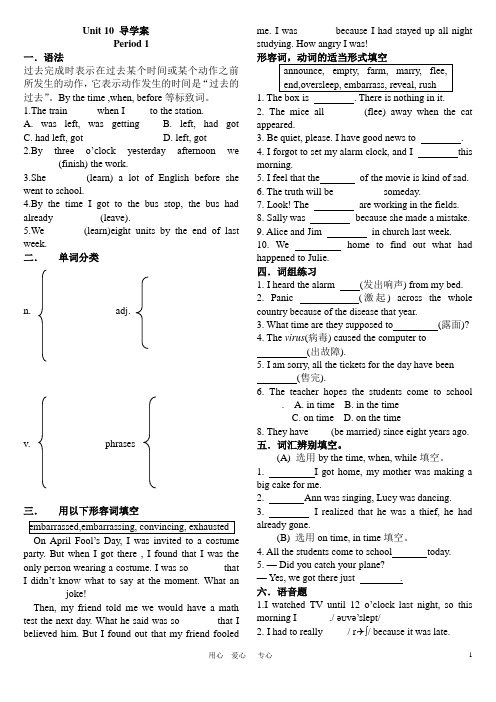
Unit 10 导学案Period 1一.语法过去完成时表示在过去某个时间或某个动作之前所发生的动作,它表示动作发生的时间是“过去的过去”。
By the time ,when, before等标致词。
1.The train _____ when I ____ to the station.A. was left, was gettingB. left, had gotC. had left, gotD. left, got2.By three o’clock yesterday afternoon we _______(finish) the work.3.She _______(learn) a lot of English before she went to school.4.By the time I got to the bus stop, the bus had already _________(leave).5.We _______(learn)eight units by the end of last week.二.单词分类n. adj.v. phrases三.用以下形容词填空embarrassed,embarrassing, convincing, exhausted On April Fool’s Day, I was invited to a costume party. But when I got there , I found that I was the only person wearing a costume. I was so ______ that I didn’t know what to say at the moment.What an ________ joke!Then, my friend told me we would have a math test the next day. What he said was so _______that I believed him. But I found out that my friend fooled me. I was _______because I had stayed up all night studying. How angry I was!形容词,动词的适当形式填空announce, empty, farm, marry, flee,end,oversleep, embarrass, reveal, rush1. The box is . There is nothing in it.2. The mice all _______(flee) away when the cat appeared.3. Be quiet, please. I have good news to .4. I forgot to set my alarm clock, and I this morning.5. I feel that the of the movie is kind of sad.6. The truth will be _________ someday.7. Look! The are working in the fields.8. Sally was because she made a mistake.9. Alice and Jim in church last week.10. We home to find out what had happened to Julie.四.词组练习1. I heard the alarm (发出响声) from my bed.2. Panic (激起) across the whole country because of the disease that year.3. What time are they supposed to (露面)?4. The virus(病毒) caused the computer to(出故障).5. I am sorry, all the tickets for the day have been(售完).6. The teacher hopes the students come to school _____. A. in time B. in the timeC. on timeD. on the time8. They have ____(be married) since eight years ago. 五.词汇辨别填空。
人教版九年级英语Unit 10 By the time I got outside, the bus had already left. SectionB说课稿
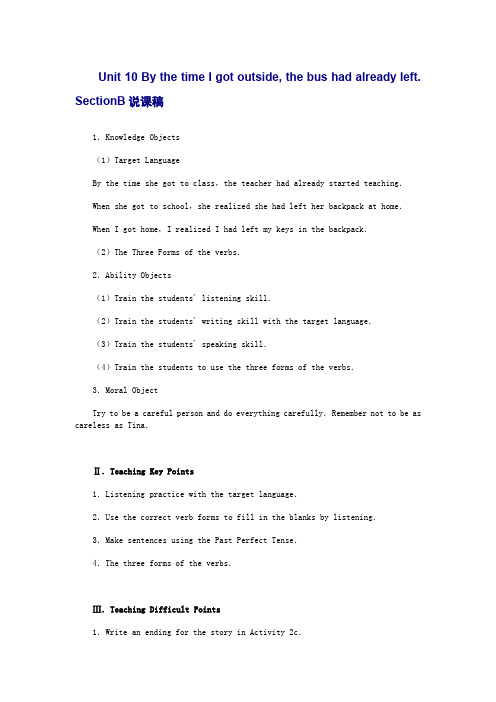
Unit 10 By the time I got outside, the bus had already left. SectionB说课稿1.Knowledge Objects(1)Target LanguageBy the time she got to class,the teacher had already started teaching.When she got to school,she realized she had left her backpack at home.When I got home,I realized I had left my keys in the backpack.(2)The Three Forms of the verbs.2.Ability Objects(1)Train the students' listening skill.(2)Train the students' writing skill with the target language.(3)Train the students' speaking skill.(4)Train the students to use the three forms of the verbs.3.Moral ObjectTry to be a careful person and do everything carefully.Remember not to be as careless as Tina.Ⅱ.Teaching Key Points1.Listening practice with the target language.2.Use the correct verb forms to fill in the blanks by listening.3.Make sentences using the Past Perfect Tense.4.The three forms of the verbs.Ⅲ.Teaching Difficult Points1.Write an ending for the story in Activity 2c.2.The three verb forms in Grammar Focus.Ⅳ.Teaching Methods1.Listening2.PairworkⅤ.Teaching AidsA tape recorderⅥ.Teaching ProceduresStep Ⅰ Revision1.Revise what happened to Tina in the morning by asking one or two students to tell the stroy on page 68.They may say like this:Tina had a bad morning.First of all she overslept.By the time she got up,her brother had already gotten in the shower.And by the time she went outside,the bus had already left.She had to run all the way to school.When she got to school,she realized she had left her backpack at home.All these made her look stressed out.After that,ask the whole class to work in pairs.telling the stroy and helping each other in turns.Remind them to use the correct verb forms.2.Ask students to check each other's homework in pairs,pointing out all the mistakes they might have made.3.Revise the Past Perfect Tense by asking the children when to use it and what its verb structure is.Step Ⅱ 2aThis activity provides guided listening practice using the target language.We have known Tina had a bad morning.But something worse happened to Tina later.Let's go to Activity 2a on page 69 and see what happened to Tina later in the morning.Read the instructions to the class.Be sure that all of them know what to do.Call the students' attention to the four pictures.Get them to guess the correct orderof the pictures first.The first one is given as a sample.Ask one or two children to tell their stories by describing the pictures according to their own order.Then,we will hear Tina talking about what happened to her after she got to school.We can see there is a small box in each picture.Please write a number from 1 to 4 in each box to show each picture's correct order.The first one has been given as a sample.Get the children to get ready to listen to Tina continue her story.Play the recording the first time,students only listen.Play the recording again and ask the children to number each picture.Check the answers with the class and see who have ever got the correct answers without listening.AnswersThe pictures should be numbered in this order:3 1 2 4TapescriptBoy:So then what did you do,Tina?Girl:Well,I ran home to get my backpack.But when I got home,I realized I had left my keys in the backpack.Boy:You're kidding!Girl :So I ran back to school without my keys or my backpack.And by the time I got back to school,the bell had rung.Boy:Oh,no!Girl:And by the time I walked into class,the teacher had started teaching already.She asked for our homework,but of course I didn't have it.Step Ⅲ 2bThis activity gives students practice in understanding and writing the target language.Ask the students to read the instructions together.Point out the blanks in the sentences and the verbs in the brackets.This activity has two parts.First let's fill in the blanks with the correct verb forms.We can see some verbs in the brackets.They are the base forms of the given verbs.For example,get and got,Get is the base form of the verb.Your job is to write the correct forms of these verbs in the blanks.Look at number one.A sample answer is given.Let the students fill in the blanks with the correct forms individually.Move around the classroom collecting the common mistakes they may make.After they all finish writing,tell them to get ready to listen to the conversation and check their answers.I will play the recording again.Please check your answers and correct any mistakes you might have made while listening.Play the recording.Students listen and check their answers.Correct the answers by asking seven different students to say theirs to the class.Answers1.got home 2.realized 3.had left 4.got 5.had rung 6.walked 7.had startedStep Ⅳ 2cThis activity gives students oral practice with the target language.Ask the whole class to read the instructions together.We have a new task now.We know Tina was late for class.What do you think happened after Tina was late for class Work with a partner.Make up an ending for the story by continuing it.The beginning has been given.Get students to discuss in pairs,Complete the ending.Make sure they are talking in English.Move around the classroom,offering language support if needed.After ten minutes,ask students to stop discussing.Get some pairs of students to tell the class how they think the story ended.And let the whole class decide whose ending is the best.Tell each pair to write down their ending,or do it after class if time is not enough.Sample ending of the storyThe teacher looked at Tina and said,“Why are you late and where is your homework,Tina?”“I had a bad morning today.”Tina said sadly.“I'm sorry to hear that,but may I know what happened?”said the teacher.Then Tina told the teacher and the whole class her story.All her classmates laughed loudly after it.Some of them said,“Poor Tina!”Bob,one of Tina's classmates,stood up and said,“Well,Tina,I'd love to help you.Why not let me keep the keys for you?I would put your keys in my backpack.”Step Ⅴ Grammar FocusThis activity introduces the target language of this unit.Call students' attention to the sentences on the left.Ask four different students to read the foursentences and point out where had plus a past participle is used.Write the sentences on the blackboard.Draw a simple time line for each sentence to help students to understand the grammar focus.For example:Then get the students to look at the box.Teach students to read the three forms of each verbs first.Then ask several students to read the verbs to the class to see if they can read.Write the verbs on the blackboard.Ask the students to make sentences correctly using each form of the verbs in the box.For example:I usually get up at 6:30.I got up at 5:30 yesterday.By the time I got up,my sister had already gotten in the shower.Tell the students when we talk about the first thing that happened.We use had plus a past participle (had gotten)and when we talk about the second thing that happened,we use the simple past tense (got up).Ask some to read their sentences to the class.Ask the students to make their own lists of other verbs used in this unit.Tell them to put the lists in their notebooks using a three-column format like the one in the Look! section.The lists have to include these verbs: leave,walk,start,oversleep,ring,be.Check the answers.Some sample sentences with the three verb forms1.I got up at 6:30 every day.I got up at 6:00 yesterday.By the time I got up,my sister had already gotten in the shower.2.We usually go to school at 7:30.We went to school at 8:30 yesterday.By the time we got to the classroom,the students had gone to the chemistry lab.3.My father leaves home at 8:30.He left home at 9:30 this morning.When my father went outside,the bus had left.4.The teacher often starts teaching at 9:00.The teacher started teaching at 8:30 the day before yesterday.When Tina got to class,the teacher had already started teaching.The three forms of the verbs used in this unit:leave left leftwalk walked walkedstart started startedoversleep overslept oversleptring rang rungbe was/were beenStep Ⅵ SummarySay,In this class,we've done much listening and writing practice with target language.We've also done some oral practice in pairs.And we've discussed the Grammar Focus of this unit.Step Ⅶ Homework1.Write down the ending of Tina's story.2.Make sentences using each form of the verbs below:leave,walk,start,oversleep,ring,be3.Review the Grammar Focus.Step Ⅷ Blackboard DesignUnit 10 By the time I got outside, the bus had already left. 复习课实录T: Good afternoon, class.Ss: Good afternoon, Miss li.T: Sit down , please.Ss: Thank you.T: Today we’ll revise Unit 10. Let’s read the title twice.The teacher shows the title on the computer. The students read the title twice.T: As usual, we can work in groups and tell your partners what other things you thought according to the main points in this unit.The students work in groups and discuss. The teacher walks around the classroom to offer some help.T: Let’s stop here. Look at the screen and we begin to check the main phases.The teacher show the main phases on the computer. The students look at the phases and speak in English. The first four answer together. Then ask some individuals to ask.1.闹响2.把…忘在…3.忘记做…4.成功做到5.等待某人做某事6.让某人搭便车7.用车接8.穿衣给某人穿衣9.出席10.成百上千的11.结婚12.和某人结婚13.激起14. 熬夜15.出故障16.经过T: Now let’s read the phrases together.The students read them twice.T: So much for phrases. Let’s revise the Grammar. What tense did we learn in this unit?Ss: 过去完成时T: Let’s revise something about it.1. 构成: had +V过分2. 过去完成时态的含义:主要是表示在过去某个时间,或是动作之前已经发生或完成的动作.也就是:过去的过去.过去完成时态的用法:1、表示过去的过去,通常由when或by引导的短语或者从句做时间状语或时间状语从句①By the end of last year, I had learned about one thousand English words. (时间提示)②When I got there, they had already left. (动作提示)2、常用在宾语从句中①He told me he had already finished his homework.②I realized he had fooled me again。
unit10《bythetimeigotoutside,thebushadalreadyleft》期末复习卷(人教新目标初三)
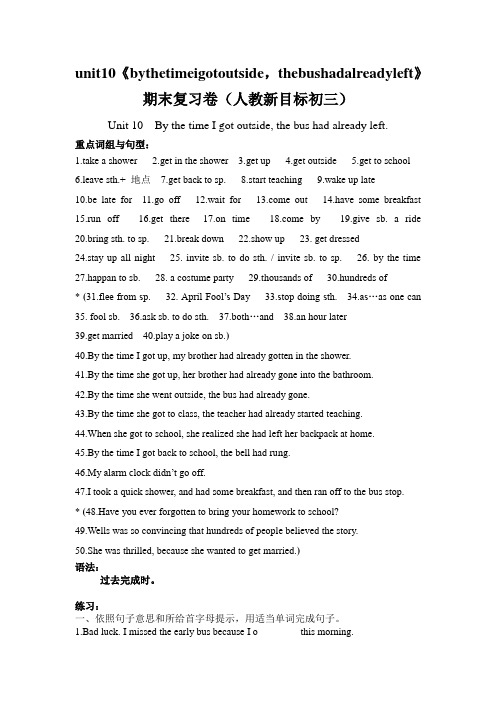
unit10《bythetimeigotoutside,thebushadalreadyleft》期末复习卷(人教新目标初三)Unit 10 By the time I got outside, the bus had already left.重点词组与句型:1.take a shower2.get in the shower3.get up4.get outside5.get to school6.leave sth.+ 地点7.get back to sp.8.start teaching9.wake up late10.be late for 11.go off 12.wait for e out 14.have some breakfast 15.run off 16.get there 17.on time e by 19.give sb. a ride 20.bring sth. to sp. 21.break down 22.show up 23. get dressed24.stay up all night 25. invite sb. to do sth. / invite sb. to sp. 26. by the time 27.happan to sb. 28. a costume party 29.thousands of 30.hundreds of* (31.flee from sp. 32. April Fool’s Day 33.stop doing sth. 34.as…as one can 35. fool sb. 36.ask sb. to do sth. 37.both…and 38.an hour later39.get married 40.play a joke on sb.)40.By the time I got up, my brother had already gotten in the shower.41.By the time she got up, her brother had already gone into the bathroom.42.By the time she went outside, the bus had already gone.43.By the time she got to class, the teacher had already started teaching.44.When she got to school, she realized she had left her backpack at home.45.By the time I got back to school, the bell had rung.46.My alarm clock didn’t go off.47.I took a quick shower, and had some breakfast, and then ran off to the bus stop.* (48.Have you ever forgotten to bring your homework to school?49.Wells was so convincing that hundreds of people believed the story.50.She was thrilled, because she wanted to get married.)语法:过去完成时。
人教版英语九年级Unit12单元知识点归纳
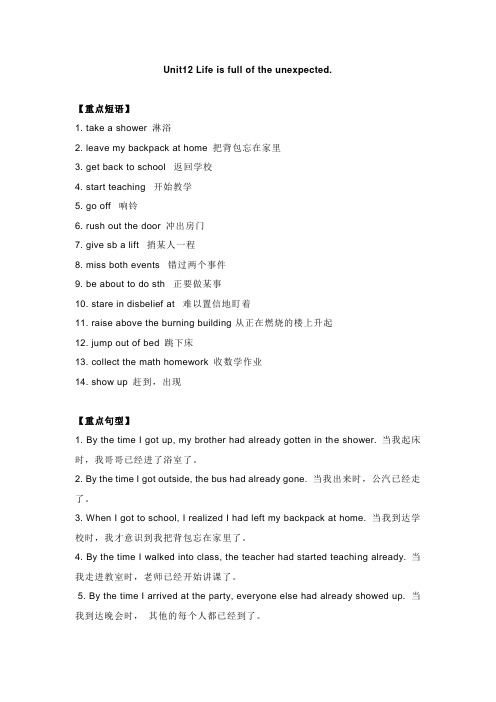
Unit12 Life is full of the unexpected.【重点短语】1. take a shower 淋浴2. leave my backpack at home 把背包忘在家里3. get back to school 返回学校4. start teaching 开始教学5. go off 响铃6. rush out the door 冲出房门7. give sb a lift 捎某人一程8. miss both events 错过两个事件9. be about to do sth 正要做某事10. stare in disbelief at 难以置信地盯着11. raise above the burning building 从正在燃烧的楼上升起12. jump out of bed 跳下床13. collect the math homework 收数学作业14. show up 赶到,出现【重点句型】1. By the time I got up, my brother had already gotten in the shower. 当我起床时,我哥哥已经进了浴室了。
2. By the time I got outside, the bus had already gone. 当我出来时,公汽已经走了。
3. When I got to school, I realized I had left my backpack at home. 当我到达学校时,我才意识到我把背包忘在家里了。
4. By the time I walked into class, the teacher had started teaching already. 当我走进教室时,老师已经开始讲课了。
5. By the time I arrived at the party, everyone else had already showed up. 当我到达晚会时,其他的每个人都已经到了。
unit 10 by the timeI got to the train station,The bus had already gone

Unit 10 By the time I got outside, the bus had already left重点词汇:1. gotten get的过去分词2. oversleep 睡过头、睡得过久3. rush 冲、奔4. lock锁、锁上5. relative 亲属、亲戚6. fool愚弄、欺骗7. empty空的、排空8. embarrassed尴尬的、为难的9. describe描述、描绘10. announce宣布、宣告11. exhausted精疲力竭的12. hoax骗局、玩笑13. flee逃跑、逃走14. farmer农民15. girlfriend女朋友16. marry嫁、娶17. ending结局、结尾18. convincing令人信服的、有说服力的重点词组及句型:1.______________到......时候2. go off发出响声3. ______________跑掉、迅速离开4. ______________按时5. ______________损坏、出故障6. ______________出席7. set off 激起、引起8. ______________卖完、售光9. ______________结婚10. ______________熬夜11. give somebody a ride ______________12. flee from 从......逃走13. a piece of 一片、一块日常用语:1. -Have you ever forgotten to bring your homework to school 你曾经忘记带作业去学校吗?-Yes, I have. 是的,忘记过。
2. Last Friday night, my friend invited me to watch some videos.上星期五晚上我的朋友邀请我看录像。
2022版新教材新高考英语一轮复习教材知识解读选择性必修第三册Unit6Natureinwords学

Unit 6 Nature in words三言两语1. As we all know, reading classic works isof great benefit because it can improve our studying career and enrich our everyday life.2. Getting close to nature can help people clear their mind and find the balance of their hearts, so that they will be full of energy when they come back to work.3. What makes it distinguish from other resorts is that it is rich in natural resources and primitive forests. 1. 这就是鼓浪屿,一个美丽而诱人的岛屿,在那里等待着热烈的欢迎。
Such is Gulangyu, a beautiful and inviting island, where a warm welcome awaits. 2. 现在,越来越多的人开始认识到,目前的环境与我们对地球的所作所为有很大关系。
Now more and more people become aware that the present environment has much to do with what we have done to the earth.核心单词[默写识记]根据汉语释义写出单词1. weekly adj.一周一次的,每周的2. prospect n.开阔的景观,景色3. bend v.变弯曲4. enhance v.改进;增强5. wheat n.小麦37. marine adj.海洋的38. rhyme n.儿歌,童谣39. church n.教堂40. chorus n.合唱曲熟词生义1. (2018·浙江卷)Among the bag makers' arguments:many cities with bans still allow shoppers to purchase paper bags, which are easily recycled but require more energy to produce and transport.禁令2. In relating the story to Julie, he decided to bend the truth just enough to make her believe he had really been in great danger.歪曲;扭曲高频短语短语应用1. be famous for因……而出名2. be irrelevant to 和……无关3. in particular 尤其;特别4. dozens of 许多5. come round 拜访;发生6. be aware of 意识到7. break out 爆发8. at the risk of 冒着……风险9. transform... into... 把……变成……10. add to 增加11. be accessible to 易接近的;易受影响的[语境运用1]填入一个适当的词1. John rescued the drowning child at the risk of his own life.2. A big fire broke out in Sichuan, where 19 firefighters lost their lives to put it out.3. This trip, I believe, will add to your knowledge and understanding of our country.4. If a computer user fails to log off, the system is accessible to all.5. Dessert is abundant in sugar, while sugar can be transformed into fat.[语境运用2]填入一个适当的词There are many famous actresses in thiscountry, some of whom have been verypopular with us. People like an actress inthis city 1. in particular. She is famous 2.for starring in dozens 3. of TV series,which are highly thought of by her fans.However, recently she has been chargedwith tax evasion (偷税). Although maybeshe is irrelevant 4. to this scandal, we areaware 5. of the fact that everything willcome to light sooner or later.教材原句背诵句式仿写应用1. 形容词(短语)作状语Many people spoke of them, puzzled and disturbed. 我们回到了家,累但是很高兴。
九年级英语by the time i got outside,the bus had already left练习题3

Unit 10 By the time I got outside,the bus had already left.温故知新(课前复习类训练)●Word recycling and grammar reviewing(旧词循环和语法复习)Ⅰ.Write down the correct form of the word according to the request.(根据要求写出单词的相应形式。
)1.teach(名词)______________2.leave(过去式) ______________3.reply(同义词) ______________4.realize(现在分词) ______________5.forget(过去分词) ______________6.early(比较级)______________7.final(副词) ______________ 8.ring(过去分词) ______________9.dress(第三人称单数形式) ______________ 10.really(形容词) ______________答案:1.teacher 2.left 3.answer 4.realizing 5.forgotten 6.earlier7.finally8.rung 9.dresses10.realⅡ.Fill in the blank with the right word form.(用单词的适当形式填空。
)1. _________they_________(get)to the farm on time last Monday?2.You can finish the work_________(easy).3.I _________never_________(be)late for school.4.you ever_________(forget)a relative’s birthday?5.They gave me a_________(ride)on the way to school.答案:1.Did,get由last Monday可知应用一般过去时。
Unit_10__by_the_time_I_got_outside._the_bus_had_already_left._教学建议
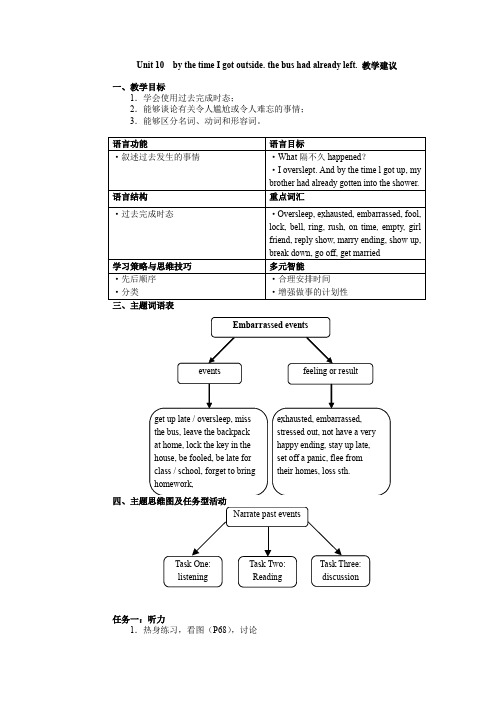
Unit 10 by the time I got outside. the bus had already left. 教学建议一、教学目标1.学会使用过去完成时态;2.能够谈论有关令人尴尬或令人难忘的事情;3.能够区分名词、动词和形容词。
任务一:听力1.热身练习,看图(P68),讨论What do you usually do in the morning before school?Do you get up early in the morning?Are you late for school?What happened to Tina?2.通过听力练习,帮助学生输入地道的语言材料,为提高学生口语表达能力及输出奠定基础。
任务二:阅读1.通过阅读训练,培养学生获取信息的能力,同时巩固句型和扩大词汇量2.学会欣赏,在学生获取信息的基础上,引导学生欣赏和积累优美、正确、地道的语言材料,为口语和书面表达奠定基础。
3.通过阅读,了解到西方国家愚人节发生的事情,并引导学生理智地分析所发生的事件任务三:讨论1.叙述Tina的经历,并为其经历续写结尾2.回忆并叙述我们生活中经历的尴尬事情3.回忆并叙述生活中难以忘怀的事情五、可供教师选择的任务活动Sample 1 Tina尴尬的早晨(with the help of the pictures on the book), 并为故事续写结尾。
引导学生用过去完成时态,叙述事情,注意事情发生的先后顺序,发挥想象给出一个合理的结尾。
操作建议:1.完成听力任务(1b, 2a & ab)朗读对话,加强语言输入2.同桌之间根据图示以第三人称叙述Tina的经历3.全班共同讨论故事的结尾,看谁给出的结尾更符合逻辑关系又体现人与人之间的友爱。
拓展的词汇:forgive, stationeries, habitsSample 2 谈谈上周的某天或进来的某个早晨发生的事情。
- 1、下载文档前请自行甄别文档内容的完整性,平台不提供额外的编辑、内容补充、找答案等附加服务。
- 2、"仅部分预览"的文档,不可在线预览部分如存在完整性等问题,可反馈申请退款(可完整预览的文档不适用该条件!)。
- 3、如文档侵犯您的权益,请联系客服反馈,我们会尽快为您处理(人工客服工作时间:9:00-18:30)。
课题:Unit 6(Section A 1a-2c)主备人:吴兰英备课时间:上课时间:一、明确目标1. 能够掌握本节课出现的重点短语和句子。
2. 掌握部分不规则动词过去分词的拼写形式及过去完成时的用法。
二、自主学习(一)新知探寻:1. 通过预习,同学们能又快又准确写出下列单词的过去式和过去分词吗?go _______ _______ leave _______ _______ get _______ _______start _______ _______ ring _______ _______ give_______ _______come ______ _______ take _______ _______2. 请同学们认真预习课文,从课文中找出这些重点短语。
(1)洗澡(淋浴)(2)到…时候为止(3)起床(4)把…落在家里(5)到了我起床的时候,我哥哥(弟弟)已经在洗澡(淋浴)了。
________________________________________________________________(6)当她到了学校的时候她才意识到我把她的书包落在家里了________________________________________________________________(二)疑难困惑:三、展示交流1. 比一比赛一赛:各小组长提问其它小组成员课前准备的短语,看哪个小组完成得最棒!2. 1a 认真观察图片看看图片中的人在干什么,然后跟小组内的同学们讨论下你们早晨上学前都干些什么?你喜欢早晨吗?为什么?3. 1b 听录音然后把对话内容补充完整。
并在小组内共同订正听力的答案。
4. 1c 两人一组根据图画的内容自己完成一组对话。
5. 2a & 2b Listen to the tape and finish 2a and 2b.6. 小组长带领大家讨论一下听力的答案,并负责解答组内其他同学的疑问。
7. 2c 根据你的理解给2b部分的短文写一个结尾,看谁写的最好。
四、合作探究小组合作,总结一下过去完成时态的结构、用法和标志词。
然后组间交流,教师点拨。
五、达标拓展(一)根据汉语提示完成句子。
1. 我出去的时候公共汽车已经开走了。
____ _____ ___I got outside, the bus____ already_______.2. 她到达学校的时候,意识到把书包落在家里了。
_____ she got to school, she _____ she ____ ______ her backpack at home.3. 我返回学校的时候,铃已经响了。
By the time I ____ ____ to school, the bell ______ _______.教学后记:1. 能够掌握本节课出现的重点短语和句子。
2. 掌握部分不规则动词过去分词的拼写形式及过去完成时的用法。
3. 了解现在完成时和过去完成时的区别。
二、自主学习(一)新知探寻:从课本中找出下列重点短语,并写在下面。
1. 迟到2. (闹钟)发出响声3. 醒来4. 等待,等候5. 迅速离开,跑掉6. 顺便捎某人7. 按时,准时8. 及时9. 出故障10. 出来,出现(二)疑难困惑:三、展示交流1. 将课前准备的情况在小组内交流讨论(老师点拨)。
2. 比一比赛一赛:各小组长提问其它小组成员讨论结果,看哪个小组完成得最棒!3. 3a 预习课文把课文中发生的事件按照时间先后顺序写下来。
4. 小组合作,共同找出课文中的重点短语和句型,并讲解给同学们。
5. 3b小组讨论,小组内讨论一下3b中所提到的这些事情你是否曾经发生过,如果发生了这样的事情应该怎么处理?6. 组间交流,小组之间互相交流一下讨论的结果,看谁的办法最好。
四、合作探究小组合作,总结一下现在完成时态和过去完成时态的用法区别是什么。
现在完成时:过去完成时:五、达标拓展(一)用单词的适当形式填空。
1. ---Did Jim watch the football match? ---He told me that he _________ (watch) it.2. When they ________ (reach) the station, the train ____________ (leave).3. By the end of last term, we ____________(learn) over two thousand new words.4. --- ________ the students ________ (sweep) the floor? ---No, they haven’t.5. ---What does she usually do on Sundays? ---She usually __________ (write) to her friends.6. ---Where were you yesterday? ---I _________ (go) to the movies near my home.教学后记:1. 能够区分名词、动词、形容词及构词法的知识。
2. 掌握本课时出现的单词和短语。
3. 能够描述发生过的事情。
二、自主学习(一)新知探寻:1. 查找已学过的加前缀或后缀构成的单词,了解派生词的构成知识。
2. 列出部分学过的动词、名词和形容词,能够正确区分单词的词性。
3. 请同学们认真预习课文,从课本中找出这些重点短语。
(1)打扮(2)露面(3)邀请某人做某事(4)(铃)响(5)熬夜(6)愚人节4. 了解有关愚人节的知识。
(二)疑难困惑:三、展示交流1. 预习情况交流:与同学或老师讨论你的问题。
2. 完成1a表格并补充课前准备的词汇。
3. 阅读1b的例文,然后向同学讲一讲近来发生在自己身上的事情,可利用1a表格中列举的单词。
4. 2a&2b 根据听力内容要求完成2a 和2b,并在小组内交流,确定正确答案。
5. 2c 根据2a和2b 部分的内容完成对话。
6. 分组描述所听到的有关愚人节的故事,然后课堂展示。
四、达标拓展(一)单项选择。
1. More and more foreigners want to _______ their companies in Zhejiang.A clean upB look upC pick upD open up2. Many girls like ______ skirts in summer. A wearing B dressing C in D look out3. Mr Li would like to _____ us an interesting story. A tell B talk C say D speak4. This TV set is too loud, will you please _____?A turn down itB turn it downC to turn it downD to turn down it5. Dick isn’t here. He ____ the cinema.A has gone toB has been toC has been awayD has been with6. I bought a new dictionary and it ____ me 30 yuan . A paid B spent C took D cost7. ____ a cold winter evening an old friend came to visit me. A In B On C By D At(二) 根据汉语提示完成句子。
1. 上个周五晚上我的朋友邀请我去看足球赛。
Last Friday night my friend _____me _____ ______ football match.2. 我们真的熬到很晚。
We ______ ______ really late.3. 愚人节那天大卫怎么了?What ________ ______ Dave _____ _______ _______ ______?教学后记:课题:Unit 6(Section B 3a-selfcheck)主备人:吴兰英备课时间:上课时间:一、明确目标1. 掌握课本中出现的重点单词和短语。
2. 掌握课文中出现的重点句型。
3. 进一步熟练运用过去完成时态,叙述事情。
4. 用过去完成时描述生活中的尴尬事情或难以忘怀的事情。
二、自主学习(一)新知探寻:1. 熟读课文,找出重点和难点,标出重点词组和过去完成时的句子。
2. 请同学们认真预习课文,从课本中找出这些重点短语。
(1)在地球着陆(2)穿过美国(3)如此…以至于(4)激起,引起(5)全国(6)成千上万的(7)从家中逃走(8)停止干某事(9)卖完,售光(10)结婚(11)有一个美好的结局(12)出席,露面(二)疑难困惑:三、展示交流1. 将课前准备的情况在小组内交流讨论(老师点拨)。
2. 比一比赛一赛:各小组长提问其它小组成员讨论结果,看哪个小组完成得最棒!3. 小组讨论,阅读课文然后讨论一下这些故事哪个最可信,哪个最不可信?为什么?4. 小组合作弄懂每个句子的意思,并找出课文中的重点短语和句型。
并推荐一名同学讲解课文中的重点知识点。
5. 3b根据课本上2a和2b部分提供的信息写一篇短文。
6. 创新挑战“我的故事”给同学们讲一个发生在自己身上的好玩的故事,看谁的故事最精彩!7. 观察课本46页第2部分的图画,然后写一篇短文,描述一下她一天发生的事情。
四、合作探究小组合作,总结一下跟up 和off相关的短语有哪些,看哪个小组找的最多!五、达标拓展(一) 单项选择。
(二)根据汉语提示完成句子。
1. 韦尔斯的言论如此的有说服力,以至于上百人都相信了他的说法,恐慌一时遍布全国。
Welles was ______ ________ ________ ________ ________ people believed the story, and panic ______ _______ across the whole country.2. 生产意大利面条的农民停止了生产。
The spaghetti farmers in Italy had _______ ________ spaghetti.3. 许多人跑到当地的超市买尽可能多的意大利面条。
Many people ran to their local supermarket to buy _____ ______ spaghetti ____ they could.课题:Unit 6(知识清单)主备人:吴兰英备课时间:上课时间:一、复习目标1. 本单元的重点单词和重点短语。
